- Home
- Publications
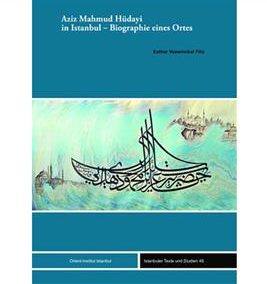
Aziz Mahmud Hüdayi in Istanbul – Biographie eines Ortes
| Subject | Aziz Mahmud Hüdayi‘nin (1541-1628) hayatı, Üsküdar’daki türbesi, Istanbul’da Sufismin kültürü |
| Author | Dr. Esther Voswinckel Filiz |
| Year | 2022 |
| ISBN/ISSN | 978-3-95650-989-6 |
| Publisher | Orient-Institut Istanbul |
| Summary | Aziz Mahmud Hüdayi (1541 – 1628) şöhreti İstanbul sınırlarının çok ötesine taşan bir Osmanlı mutasavvıfıdır. Celvetiyye tarikatının “ikinci piri” (pir-i sânî) olarak kabul edilen Aziz Mahmud Hüdayi sultanların hocası, İstanbul Boğazı ve denizcilerin koruyucusu olarak bilinir. Üsküdar’daki türbesi, günümüzde hâlâ farklı insanlar tarafından ziyaret edilen çok canlı bir dinî cazibe noktasıdır. Esther Voswinckel Filiz’in din antropolojisi çalışması Üsküdar’da yıllar süren bir alan araştırmasına dayanıyor. İnsanların burada veli ile nasıl bir ilişki içerisinde olduklarını, mekânın çok katmanlı maddeselliğini, eski ile yeni, taşınır ile taşınmaz ve keza mevcut ile namevcut olanın mekânda birlikteliğini ve bu ilişkide nasıl bir rol oynadığını bu eserde inceliyor. Kitap, Üsküdar’ın türbe ziyaretleriyle ilgili dinî âdet ve geleneklerinden geleneksel şifa sanatına, rüya tabirlerine, geçmişten günümüze sözlü kültüründe nesilden nesile aktarılarak taşınmış evliya menakıplarına ve türbedeki tâc-ı șerîf denilen sanduka başlıklarının dikilmesi ve sarılmasına varıncaya kadar birçok meseleye eğiliyor. 20. yüzyılda yaşamış çeşitli mutasavvıf şahsiyetlerin hayatları üzerine birçok çalışma olmasına rağmen 1925’den günümüze tasavvufun maddi kültüre ve “eşyaları”na bakan yönü nadiren ele alınmıştır. Kitap, İstanbul’un dinî tarihinin kendine özgü bu boyutuna yönelmektedir. |
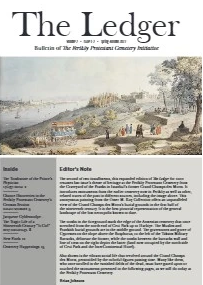
The Ledger
| Subject | Cemeteries |
| Author | |
| Year | 2022 |
| ISBN/ISSN | |
| Publisher | ORIENT-INSTITUT ISTANBUL |
| Summary | The Ledger. Bulletin of the Feriköy Protestant Cemetery Initiative is the jointly published journal of the scientific advisory board of the central cemetery for foreign Protestant and non-Catholic or Orthodox Christians in Istanbul, which was founded in 1859. Due to its cultural and historical significance, the cemetery is registered as a “significant cemetery” by the Association of Significant Cemeteries of Europe (ASCE). The advisory board includes academics from the Orient-Institut Istanbul and the foreign research institutes of Great Britain, the Netherlands, the United States, Switzerland, Sweden and Hungary based in Turkey. The journal has been published twice a year since 2021. In addition to a small free print run, The Ledger is available online on the website of the Feriköy Protestant Cemetery Initiative: http://www.ferikoycemetery.org. |
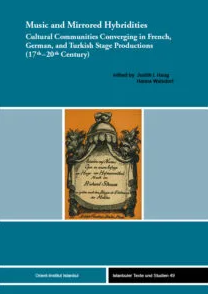
Istanbuler Texte und Studien
| Subject | Cultural Communities |
| Author | Prof. Dr. Judith I. Haug, Prof. Dr. Hanna Walsdorf |
| Year | 2023 |
| ISBN/ISSN | 978-3-98740-044-5 |
| Publisher | ORIENT-INSTITUT ISTANBUL |
| Summary | The publication series “Istanbuler Texte und Studien” (ITS) has been published by Ergon Verlag in Würzburg, Germany, since 2003. The ITS publishes regularly, if not exclusively, the findings of research conducted by academics affiliated with the Orient-Institut Istanbul as well as monographs and edited volumes connected to the institute’s research projects. After a moving wall of three years, each volume is made available free of charge as an open-access ebook on the server of the Universitäts- und Landesbibliothek Sachsen-Anhalt. Publications are externally reviewed to ensure the high quality standards of this series. |
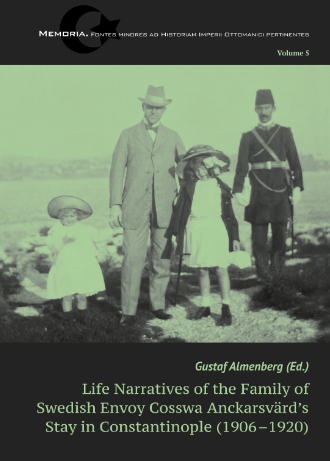
Memoria. Fontes minores ad Historiam Imperii Ottomanici pertinentes
| Subject | History and Geography |
| Author | |
| Year | 2023 |
| ISBN/ISSN | 2364-5997 |
| Publisher | ORIENT-INSTITUT ISTANBUL |
| Summary | Many smaller autobiographical sources have not been considered by scholars to date due to the fact that they were written in less common languages or because they are privately kept or otherwise difficult to access. To fill this void, the online publication series “Memoria. Fontes minores ad Historiam Imperii Ottomanici pertinentes” was established in 2015. The series is hosted by the Max Weber Foundation at www.perspectivia.net. The volumes are also available online at MENAlib Digital Publications. |
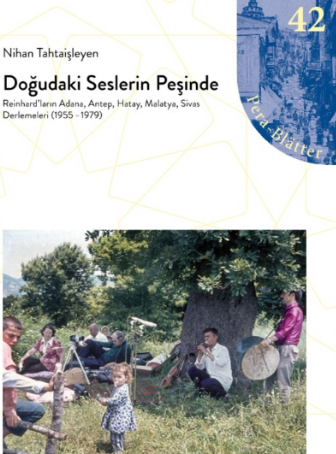
Pera-Blätter
| Subject | |
| Author | |
| Year | 2024 |
| ISBN/ISSN | 2192-5291 |
| Publisher | ORIENT-INSTITUT ISTANBUL |
| Summary | The Pera-Blätter is a series of occasional papers from the Orient-Institut Istanbul, in which contributions of between 20 and 50 pages appear as individual publications. The Pera-Blätter are printed in a limited edition in English or German and are published online in the original language and in Turkish. |
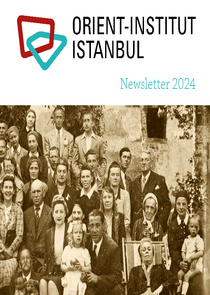
Newsletter Herbst 2024
| Subject | |
| Author | |
| Year | 2024 |
| ISBN/ISSN | |
| Publisher | ORIENT-INSTITUT ISTANBUL |
| Summary | Only Turkish and German versions are available. Click here for the German version. |
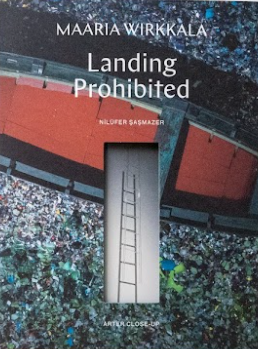
Maaria Wirkkala: Landing Prohibited
| Subject | |
| Author | Nilüfer Şaşmazer |
| Year | September 2024 |
| ISBN/ISSN | 978-605-73355-9-3 |
| Publisher | ARTER |
| Summary | The fifth book of the Arter Close-Up series offers an in-depth look at Maaria Wirkkala’s installation Landing Prohibited, first exhibited at the 52nd Venice Biennale in 2007 and acquired the same year for the Arter Collection. The publication includes an introduction text by Nilüfer Şaşmazer, the curator of the exhibition, as well as a comprehensive interview she conducted with the artist, highlighting how Wirkkala’s upbringing both in Finland (Helsinki in the south, Lapland in the north) and in Italy (Venice) influenced her works through the ever-shifting elements of these geographies, such as water, air and light. Designed by Esen Karol, the book also features installation photographs and close-up images by Orhan Cem Çetin, presenting the artwork in greater detail. |
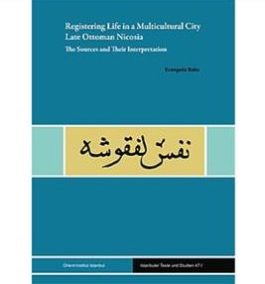
Registering Life in a Multicultural City: Late Ottoman Nicosia
| Subject | Osmanlı Nicosia’nın tarihi (Kıbrıs) |
| Author | Prof. Dr. Evangelia Balta |
| Year | 2022 |
| ISBN/ISSN | 978-3-95650-991-9; 978-3-95650-904-9; 978-3-95650-906-3 |
| Publisher | Orient-Institut Istanbul |
| Summary | İnceleme toplamda Yunan ve Osmanlı arşiv materyalini araştırmakta ve böylelikle Osmanlı egemenliğinin son yüzyılında Lefkoşa tarihinin şimdiye kadar araştırılmamış bir yönüne ışık tutmaktadır. Aynı zamanda şehrin Osmanlı tebaasına girdiği 1571’e kadar uzanan daha önceki yüzyıllardaki tarihine yönelik kimi sorulara açıklık kazandırmaktadır. Buna göre kentin topografisi (semtlerin sayısı ve adları) ve gerek Frank gerek Venedik döneminde şehirde yaşamış olan etnik-dinsel cemaatler (Yunanlar, Türkler, Ermeniler, Maronitler) hakkında şimdiye kadar geçerli olan belli başlı görüşlerin yeni bir değerlendirmesi yönünde temel oluşturmaktadır. Birinci cilt okuru Osmanlı döneminde sistematik bir muamele sonucunda baş gösteren nüfus felaketlerinin araştırma sonuçlarıyla tanıştıran ve bu sonuçları yapıtın sonraki iki cildinde yorumlayarak betimleyen tarihsel bir incelemedir. Yayının içerdiği Yunan ve Osmanlı kaynakları, Kıbrıs’ın tarihine yönelik başka temalara eğilmek isteyenler için de değerli bir malzemeyi erişilebilir hale getirmektedir. |
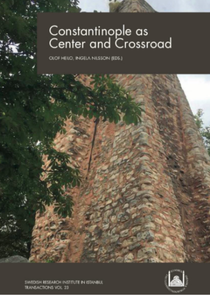
Constantinople as Center and Crossroad
| KONU | Swedish Research Institute in Istanbul Transactions Vol.23 |
| YAZAR | Ed. Olof Heilo, Ingela Nilsson |
| YIL | 2019 |
| ISBN/ISSN | 978-91-85333-98-1 |
| YAYINCI | Eddy |
| ÖZET | The 23rd Transaction of Swedish Research Institute in Istanbul |
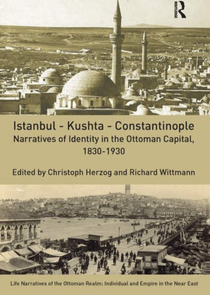
Istanbul-Kushta-Constantinople
| Subject | Narratives of Identity in the Ottoman Capital, 1830-1930 |
| Author | Ed. Christoph Herzog and Richard Wittman |
| Year | 2019 |
| ISBN/ISSN | 978-1-138-63131-1 |
| Publisher | Routledge |
| Summary | Life Narratives of the Ottoman Realm: Individual and Empire in the Near East |
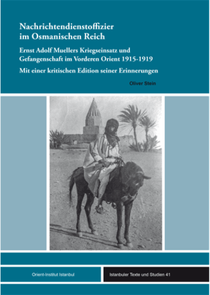
Nachrichtendienstoffizier im Osmanischen Reich : Ernst Adolf Muellers Kriegseinsatz und Gefangenschaft im Vorderen Orient 1915-1919 : mit einer kritischen Edition seiner Erinnerungen
| Subject | Ottoman Empire, Germany, WWI, prisoner of war, military intelligence service |
| Author | Mueller, Ernst Adolf; Stein, Oliver |
| Year | 2018 |
| ISBN/ISSN | 978-3-95650-436-5 |
| Publisher | Orient-Institut Istanbul |
| Summary | This book unites the critical edition of the war memories of Ernst Adolf Mueller (1898-1990) with a scientific study on German soldiers in the Middle East during the First World War. In addition to the soldier’s everyday experiences, the book examines for the first time the local mission of the German military intelligence service, the so-called Division III b, as well as the experiences of German prisoners of war in Egypt. Starting point of the study are the memories Mueller wrote sixty years after the events. This text has a high source value in both empirical and historical terms. Especially against the background of Mueller’s entanglement in the early Nazi movement they throw an interesting light on the German memory culture in the 20th century. Special attention was paid to Mueller’s anti-Semitism and anti-Zionism, which had their starting point in his experiences during his war captivity. |

[ONLINE] Le Mort dans la ville : Pratiques, contextes et impacts des inhumations intra-muros en Anatolie, du début de l’Age du Bronze à l’époque romaine
| KONU | Classical Archaeology, Necropolis, Urban Burial |
| YAZAR | Olivier Henry (dir.) |
| YIL | 2013 |
| ISBN/ISSN | 9782362450556 |
| YAYINCI | IFEA |
| ÖZET | Le développement de rites mortuaires complexes dans l’histoire de l’Homme a résulté dans un rôle croissant joué par les pratiques funéraires utilisées comme moyen de resserrer les liens à l’intérieur d’une même communauté. À cet égard, le singulier usage d’inhumer un individu au cœur de la communauté révèle avec acuité la force de cette relation que pouvaient entretenir les vivants et les morts. Les découvertes archéologiques récentes ont souligné l’importance de telles pratiques liées aux inhumations intra-muros en Anatolie. Bien qu’il semble possible de tisser un lien continu entre ces coutumes, les contextes dans lesquels s’inscrivent la pratique d’inhumer une personne au cœur même de la communauté, depuis l’enfant du Néolithique à Çatalhöyük à la libraire de Celsius à Ephèse, en passant par le Mausolée d’Halicarnasse, ont néanmoins radicalement changés en fonction des époques et des lieux. L’objectif de ce volume, en rassemblant des spécialistes de périodes et d’horizons différents, est d’offrir non seulement un point général de nos connaissances sur ces questions, mais aussi un éclairage concernant le mécanisme de ces pratiques, leur contexte et leur impact en Anatolie, du début de l’Âge du Bronze à l’époque romaine. |
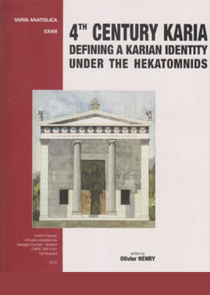
[ONLINE] 4th Century Karia. Defining a Karian identity under the Hekatomnids
| KONU | Classical Archaeology, Labraunda Excavations, Karian Civilization |
| YAZAR | Olivier Henry (dir.) |
| YIL | 2013 |
| ISBN/ISSN | 9782362450082 |
| YAYINCI | IFEA |
| ÖZET | The origins, identity and political behaviors of the Karians remain the subject of intense discussion among specialists. The political organization of Western Asia Minor during the 4th century BC offers an opportunity to explore such questions; it was during this period that local dynasts, the Hekatomnids, reached a position of authority in the region that allowed them to fully express their political ambitions and to promote their own material culture. Analyses of various aspects of this material culture have led scholars to describe the Hekatomnids in very different ways. They have been portrayed both as Persian dynasts and Proto-Hellenistic Kings, although they were neither Greek nor Persian This ambiguity is the result of attempts to approach the cultural identity of 4th century Karia in the light of the cultural power of its neighbors, rather than as the result of an intricate process of cultural interaction that included both local traditions and foreign borrowings. Hekatomnid Karia is representative of the complex phenomenon of hybrid cultures that would later flourish in the Hellenistic World. Gathering specialists on Karian research, each offering a different approach, this book aims to cover a wide number of sources, from archaeological to geographical and historical. The collection of essays provides an in |

Merging Techniques and Cultures Technological Approaches in Archaeology. Istanbul 24-25 Novembre 2015, 6èmes Rencontres d’archéologie de l’IFÉA
| KONU | Archaeology, History of Techniques |
| YAZAR | Martin Godon (dir.) |
| YIL | 2018 |
| ISBN/ISSN | 978-2-36245-071-6 |
| YAYINCI | IFEA |
| ÖZET | This edition of the Sixth IFEA Archaeological Meeting presents a compilation of texts dedicated to technological approaches in material studies. The central subject of this book is to show some of the diversity of researches in this field, paying particular attention to Anthropology of techniques, methodology, and development of technological processes’ studies in Turkey. Technological choices, cultural implications and environmental or technical determinism in the development of technological processes are also discussed throughout the different articles. We conceived this book as an educational support for students and researchers eager to discover the Anthropology of techniques and its related research methodologies. While delivering specific examples from lithic, rock cutting, ornaments making and pottery studies, a specific care is given to the bibliographical references, some of them available in the IFÉA’s library, to help the reader develop his knowledge and accompany him further in his research. 116 pp, pb, articles in English and French. |
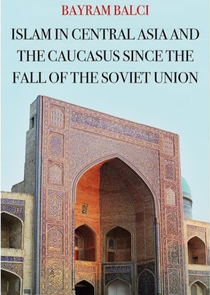
Islam in Central Asia and the Caucasus Since the Fall of the Soviet Union
| KONU | Islam, Caucasus, Central Asia, Political Science |
| YAZAR | Bayram Balcı |
| YIL | 2018 |
| ISBN/ISSN | 9781849049689 |
| YAYINCI | Hurst |
| ÖZET | With the end of the Soviet Union in 1991, a major turning point in all former Soviet republics, Central Asian and Caucasian countries began to reflect on their history and identities. As a consequence of their opening up to the global exchange of ideas, various strains of Islam and trends in Islamic thought have nourished the Islamic revival that had already started in the context of glasnost and perestroika—from Turkey, Iran, the Arabian Peninsula, and from the Indian subcontinent; the four regions with strong ties to Central Asian and Caucasian Islam in the years before Soviet occupation. Bayram Balci seeks to analyse how these new Islamic influences have reached local societies and how they have interacted with pre-existing religious belief and practice. Combining exceptional erudition with rare first-hand research, Balci’s book provides a sophisticated account of both the internal dynamics and external influences in the evolution of Islam in the region. |
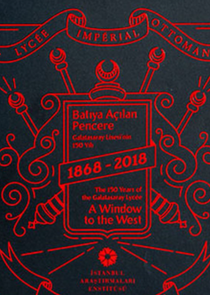
Batıya Açılan Pencere Galatasaray Lisesi’nin 150 Yılı
| KONU | Galatasaray Lisesi |
| YAZAR | Kolektif |
| YIL | 2018 |
| ISBN/ISSN | 978-605-4642-81-6 |
| YAYINCI | İstanbul Araştırmaları Enstitüsü Yayınları |
| ÖZET | 1868 yılında, Abdülaziz’in Fransa İmparatoru III. Napoléon’la kurduğu yakın ilişki sonucu hükümetin iki etkili bakanı Âli ve Fuad paşaların girişimiyle projelendirilen Mekteb-i Sultani (Lycée Impérial Ottoman da Galata Serai) ise Avrupa’nın en ileri standartlarına sahip bir orta öğretim kurumu olarak tasarlanarak hayata geçirildi. Laik eğitimin de ilk örneği sayılabilecek olan bu yeni tasarım, açılışından itibaren rağbet gördü ve 1871 yılından itibaren verdiği mezunlarla yenilikçi bir eğitim geleneği oluşturdu. Günümüzden yüz elli yıl önce Mekteb-i Sultani’yle yaşanan dönüşüm, gerek Osmanlı Devleti’nin son döneminde, gerekse 1923 yılında Galatasaray Lisesi adını aldıktan sonra, kurumun simgeleşip, öğrenci ve mezunlarına sosyokültürel bir üst kimlik sağlamasına yol açtı. Sergi, 1868’den bu yana süren bir nitelikli insan yetiştirme vizyonundan kesitler sunarak, bir kamu kuruluşunun nadir rastlanır özerk kurumsallaşma öyküsünde saklı olan ilhamı paylaşmak amacıyla tasarlandı. Editörlüğünü, serginin küratörü olan İzzeddin Çalışlar’ın yaptığı katalog, Emel Engin, Fethi İsfendiyaroğlu, Seza Sinanlar Uslu, Gülsün Güvenli Vahdettin Engin, Köksal Bayraktar, Yıldızhan Yayla, Tarkan Okçuoğlu, Melih Şabanoğlu ve İzzeddin Çalışlar’ın Galatasaray Lisesi’nin tüm yönleriyle ele alındığı kapsayıcı makalelerinden oluşuyor. |
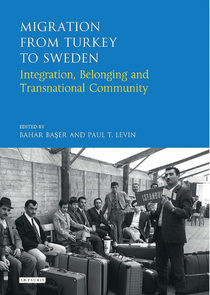
Migration from Turkey to Sweden : Integration, Belonging and Transnational Community
| KONU | Migration History, Turkish & Swedish Relations, Social Integration |
| YAZAR | Bahar Başer & Paul T. Levin |
| YIL | 2017 |
| ISBN/ISSN | 978-1-78453-869-9 |
| YAYINCI | I. B. Tauris |
| ÖZET | Transnational Communities |
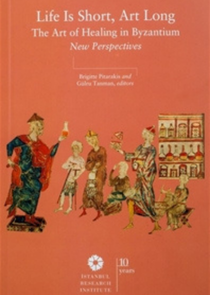
Life is Short, Art Long The Art of Healing in Byzantium New Perspectives
| KONU | Şifa, Tıp, Tedavi |
| YAZAR | Kolektif |
| YIL | 2018 |
| ISBN/ISSN | 978 605 4642 – 76-2 |
| YAYINCI | İstanbul Araştırmaları Enstitüsü Yayınları |
| ÖZET | Yaşamın merkezinde yer alan şifa, tıp, tedavi konuları ekseninde Bizans’a yeni bir yaklaşım getirmeyi amaçlayan bu kitap, dini inançlardan doğaüstü güçlere, ebedi ahiret algısından İstanbul ve Anadolu’da şifa merkezlerine, tıp literatüründen eczacılıkta kullanılan egzotik maddelere erişim yollarına, ağız sağlığından besin alışkanlıklarına, Eski Yunan mitolojisinden tanrı Asklepios’a uzanan geleneklere, Erken Osmanlı’da duyuları harekete geçiren hastane mimarisi düzenine, disiplinler arası köprüler uran on üç makaleden derlenmiştir. İçerik 2015’te Pera Müzesi’nde yer alan Hayat Kısa, Sanat Uzun: Bizans’ta Şifa Sanatı sergisi kapsamında, 14 Mart Tıp Bayramı günü düzenlenen sempozyum bildirilerinden yola çıkmıştır. Kitabın dili İngilizcedir. |
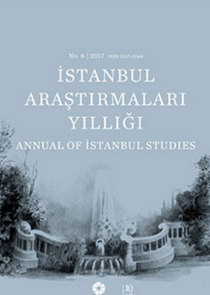
İstanbul Araştırmaları Yıllığı No.6
| KONU | |
| YAZAR | Kolektif |
| YIL | 2017 |
| ISBN/ISSN | 2147-2068 |
| YAYINCI | İstanbul Araştırmaları Enstitüsü Yayınları |
| ÖZET | Dünyada pek az kentte rastlanan çok renkli bir kültür dağarcığına sahip olan İstanbul’da farklı etnik kökenlerden, dil ve inançlardan insan toplulukları yaşamış ve yüzyıllar içinde birbirine eklemlenen kültür sentezleri yaratmışlardır. İstanbul Araştırmaları Enstitüsü de, kentin bu zengin kültürel çeşitliliğinin ve kültürler arası etkileşimlerin incelenmesi ve sunulması amacıyla yola çıktı. Onuncu yılını tamamlayan Enstitü’nün, altıncı yılını süren İstanbul Araştırmaları Yıllığı da bu amaca hizmet eden önemli yayınlardan biri. Yıllığın altıncı sayısında “Konstantinopolis’teki Paralı Asker Yazıtları, Remarques sur l’Ambassade Hafside d’Abu Amr Osman et de Molla Arab d’Après les Sources Ottomanes (Osmanlı kaynaklarına Göre Abu Amr Osman ve Molla Arab’ın Hafsî Elçiliği), İstanbul’un Alçı Pencereleri, Topkapı Sarayı’nda Bâbüssaade’nin Bazı Ayrıntıları Hakkında Düşünceler, 1882 Tarihli Bir Keşf-i Evvel İnşaat Defterine Göre Dolmabahçe Sarayı Mâbeyn-İ Hümâyûnu: Mekânları ve Onarımı, Arşiv Belgeleri Işığında 17.-19. Yüzyıllarda İstanbul Boğazı’nın Savunma Ağı, İstanbul Deniz Surları ve Koruma Sorunları, Halkalı Suları ve 1859 Tarihli Köprülü Su Yolu Haritalarının Sanat Tarihi Açısından Değerlendirilmesi ve Restorasyonu, Vaniköy’deki Merhûm Zahire Nâzırı Rıza Efendi Yalısı’na Dair, “Bir Acı Hikaye”: Mimar Vedad (Tek) Kızının Mezarını Tasarladı mı?, İstanbul’un Sessiz Tanıkları: Feriköy Latin Katolik Mezarlığı Heykelleri,Camdaki Hafıza: Ahmed Rasim, Fotoğraf ve Zaman, Hangi Usul Tenvir: Havagazı mı Elektrik mi?, Küresel Silahlanma Yarışında Osmanlı’da Fişek Üretimi: Zeytinburnu Fabrikası başlıklarını taşıyan makaleler,yayın ilkelerimiz doğrultusunda, Antik Çağ Bizans, Osmanlı ve Cumhuriyet dönemlerini kucaklayan geniş bir çerçevede kentin tarihi, arkeolojisi ve kültürel kimliğinin çeşitli boyutlarına, ayrıca kültür varlıklarının korunması ve onarımına ilişkin özgün araştırmaların ürünü olarak dikkat çekiyor. |
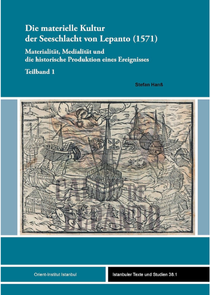
Die materielle Kultur der Seeschlacht von Lepanto (1571) : Materialität, Medialität und die historische Produktion eines Ereignisses
| KONU | History writing ; Battle of Lepanto |
| YAZAR | Hanß, Stefan |
| YIL | 2017 |
| ISBN/ISSN | 978-3-95650-264-4 |
| YAYINCI | Orient-Institut Istanbul |
| ÖZET | Based on a history of event production (histoire de l’événement), Stefan Hanß explores the contribution of early modern material culture to the production of history. Using the example of the Battle of Lepanto (1571), it shows how historical actors resorting to objects of a historical event formed a paradigm that was and will be used for binary world constructions. 2 volumes. |
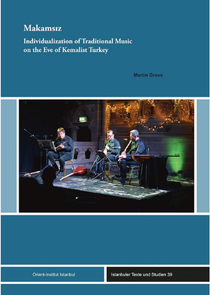
Makamsız. Individualization of Traditional Music on the Eve of Kemalist Turkey
| KONU | Music, Turkey |
| YAZAR | Martin Greve |
| YIL | 2017 |
| ISBN/ISSN | 978-3-95650-278-1 |
| YAYINCI | Orient-Institut Istanbul |
| ÖZET | The book describes the confusing, contradictory and individualized musicscape in Turkey around the turn of the twenty-first century, including its prehistory throughout the twentieth century and sometimes beyond. Its focus lies on the recent tendency towards a disintegration of musical traditions into internationalism and multiple musical hybrids which might be described as a process of individualization. The category of individual as used here includes individual musicians, individual music pieces, individual life experiences, identities and approaches to music, individual musical projects, individual CDs and concerts, even individual concepts of music theory, conferences or research projects. Several factors lead to this development: A growing rate and importance of migration and international mobility; the increase of cross-cultural encounters and experiences; the availability of almost all Ottoman-Turkish, Anatolian and global musical styles, instruments and other musical elements via media; the opening up of identity discourses. A final chapter is intended as a reflection on the question of how this unprecedented musical expansion could have happened within an authoritarian state and society such as the Republic of Turkey. |
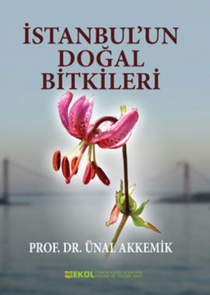
İstanbul’un Doğal bitkileri
| KONU | İstanbul-Bitki Türleri. Bitki Özellikleri |
| YAZAR | Akkemik, Ünal |
| YIL | 2017 |
| ISBN/ISSN | 978-605-63831-5-1 |
| YAYINCI | ÇEKÜL Vakfı |
| ÖZET | Araştırmacılar ve doğa tutkunları için önemli bir kaynakça niteliğindeki “İstanbul’un Doğal Bitkileri” kitabı; İstanbul Üniversitesi Orman Fakültesi Orman Botaniği Anabilim Dalı Başkanı ve ÇEKÜL Yüksek Danışma Kurulu Üyesi Prof. Dr. Ünal Akkemik’in yıllar süren araştırmalarının bir ürünü. 1152 sayfadan oluşan kitap, İstanbul’un bitki çeşitliliğini gözler önüne seriyor. 8 bin 500 yıllık tarihi bir kent olan İstanbul’daki kentleşme politikaları, yoğun nüfus baskısıyla birlikte bazı bitki türlerini doğrudan etkiliyor. Ünal Akkemik, hazırladığı bu kapsamlı çalışmayla; bu eşsiz coğrafyayı paylaştığımız doğal hayata ve kent içinde bulunan bitkilere ilgi gösterirken, ilgiye bilgi katmayı da öneriyor. Üç iklim ve flora kuşağının kesişme noktasında bulunan İstanbul, dikkat çeken bir bitki tür sayısına sahip. İstanbul’da yaklaşık 2200 bitki türünün varlığını saptayan Prof. Dr. Ünal Akkemik, kitabında 982 tanesine yer verdi. Bitki tanımını kolaylaştıran fotoğraflarla desteklenen hacimli çalışmasını çiçek renklerine göre 9 ayrı bölümde kurguladı. Kitapta, İstanbul’da yok olma tehlikesi altındaki türleri de incelemeniz mümkün. |
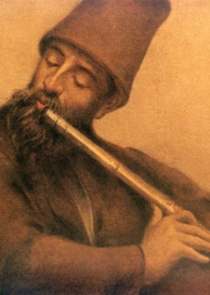
The Message has to be spread: On the Character and Significance of Media in the Dissemination of Sufi Content in the Turkish Republic
| KONU | This new issue of the European Journal of Turkish Studies, edited by Dilek Sarmis and Béatrice Hendrich, aims to question the place of media in the process of producing and disseminating artistic expressions, ideas and messages related to the Sufi realm of modern Turkey. The four articles in this issue, covering a historical span between the end of the Ottoman Empire to the present day, do not discuss the conformity to the internal logic of contents presented as a Sufi approach. Rather, to differing extents, they debate forms of mediation, mediatisation and medialisation as we encounter them in great variety in religious culture, teaching and practice generally; and particularly in the field of Islamic mysticism. The articles debate the role of those processes and the corollary of its encoding of Sufi “messages” that preexist only insofar as they are defined in terms of heritage (literary, cultural, religious, ritual and mystical) and classical transmission. |
| YAZAR | Dilek Sarmış and Béatrice Hendrich (eds.) |
| YIL | 2017 |
| ISBN/ISSN | |
| YAYINCI | European Journal of Turkish Studies 25 |
| ÖZET | Beatrice Hendrich and Dilek Sarmis Dilek Sarmis Conceptualizing mysticism through an academic perspective: the constitution of a general history of mysticism by Mehmet Ali Ayni (1868-1945) Laurent Mignon From mysticism to religious nationalism: The ambiguities of Samiha Ayverdi (1905-1993) Beatrice Hendrich Die Medialisierung religiöser Erfahrung in drei türkischen Romanen Dreams, Rhymes, Laptops. The medialization of religious experience in three Turkish novels Banu Şenay Founded in 2004, the European Journal of Turkish Studies is a peer-reviewed, open access, and interdisciplinary academic journal indexed by ERIH+ and DOAJ compliant. More about us: http://journals.openedition. |
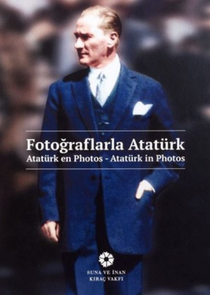
Fotoğraflarla Atatürk
| KONU | Mustafa Kemal Atatürk |
| YAZAR | |
| YIL | 2017 |
| ISBN/ISSN | 978-605-4642-71-7 |
| YAYINCI | Suna ve İnan Kıraç Vakfı Yayınları |
| ÖZET | Mustafa Kemal Atatürk’ün 1906 yılından ölümüne kadar olan süreci kapsayan Fotoğraflarla Atatürk kitabı, büyük liderin askeri ve siyasi kariyerine odaklanırken bir yandan da, Mareşal Fevzi Çakmak, İsmet İnönü, Kazım Karabekir, Rauf Orbay, Cevat Abbas, Kılıç Ali gibi silah ve dava arkadaşları ile Halide Edip, Claude Farrere gibi dönemin öncü düşün insanlarını, çeşitli Anadolu kentlerinden insan görünümlerini ve resmi ziyarette bulunan yabancı devlet adamlarını da gözler önüne seriyor. Kurtuluş Savaşı, Cumhuriyetin kuruluşu ve ilk yıllarına dair çeşitli olaylara tanıklık eden ve Türkçe, İngilizce ve Fransızca olarak 3 dilde yayınlanan kitap, Selahattin Giz, Jean Weinberg, Ali Enis Oza gibi dönemin ünlü fotoğrafçılarının karelerinden oluşuyor. |
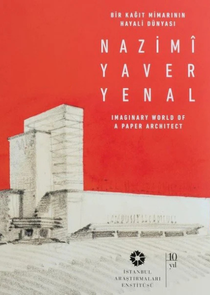
Bir Kağıt Mimarının Hayali Dünyası
| KONU | Bir Kağıt Mimarının Hayali Dünyası: Nazimî Yaver Yenal sergisi, 20. yüzyıl Türk mimarlığının özgün isimlerinden Yenal’ın (1904-1987), Sanayi-i Nefise Mektebi’ndeki öğrencilik yıllarından başlayarak 1950’li yıllara uzanan süreçteki üretimlerine odaklanıyor. |
| YAZAR | |
| YIL | 2017 |
| ISBN/ISSN | 978-605-4642-72-4 |
| YAYINCI | İstanbul Araştırmaları Enstitüsü |
| ÖZET |
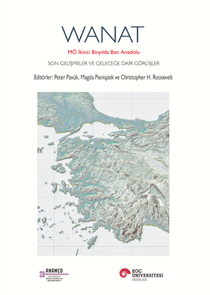
WANAT
| Subject | Cultural Heritage, Cultural History, Archaeology, Social Life and Culture, Foodways |
| Editors | Peter Pavúk, Magda Pieniążek, Christopher H. Roosevelt |
| Year | 2024 |
| ISBN | 978-605-67082-2-0 |
| Publisher | Koç University Press |
| Summary | This peer-reviewed edited volume brings together the results of a diverse group of international researchers conducting new fieldwork, applying new approaches, and making new interpretations about the archaeology of Middle and Late Bronze Age western Anatolia. The territory is huge, and it shows considerable regional diversity. What makes western Anatolian cultures different from their neighbors? Is it possible to identify discrete subregions clearly? And what trajectories of local cultural change and regional interaction did they follow? In addressing these and many other questions, the contributors to this volume provide fresh overviews of current states of research, demonstrating material and chronological synchronicities and/or gaps in knowledge that stretch across the broad territory of western Anatolia, just as they encourage further research into defining regional and sub-regional specificities. Such specificities suggest that the area should not be thought of as one monolithic cultural whole. Rather, they allude to a collection of related yet discrete units, whose shared commonalities stem from participation in overlapping spheres of communication, exchange, and political interaction, justifying their consideration together in a volume like this one. |
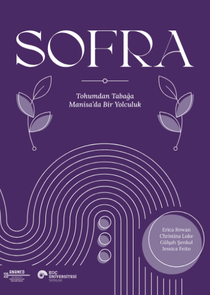
SOFRA
| Subject | Cultural Heritage, Cultural History, Archaeology, Social Life and Culture, Foodways |
| Editors | Tara Ingman (ENG), Özge Ertem (TR) |
| Year | 2024 |
| ISBN | 978-625-94521-1-1 |
| Publisher | Koç University Press |
| Summary | This is a book about and for the people, communities, and food of Manisa province, Türkiye. From the Bronze Age to the present, it is a story about the food traditions that individuals, especially women, chose to prioritise and therefore keep alive, sometimes for millennia. Yet, as food priorities shift in response to our rapidly changing world, more and more decision-making is required. Consequently, this is both a cookbook and a guidebook for those wishing to find balance in their own food priorities, as well as a permanent record of these recipes and activities. SOFRA was published with the support of the UK Arts & Humanities Research Council grant “Negotiating the Modernity Crisis: Globalization, economic gain and the loss of traditional and sustainable food practices in Turkey” (AHRC AH/V000454/1), awarded to PI Erica Rowan, Royal Holloway University, London and co-PI Christina Luke, Koç University. |
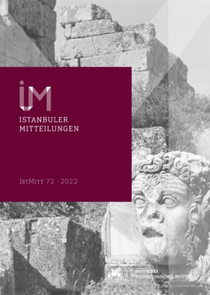
Istanbuler Mitteilungen
| Subject | Neolithic architecture of Eastern Anatolia, the Roman Imperial period, Western Anatolian coast, Byzantine Architecture sculpture in Phrygia. |
| Editors | |
| Year | |
| ISBN | |
| Publisher | |
| Summary | The latest issue of the Istanbuler Mitteilungen features numerous exciting contributions, ranging from the Neolithic architecture of Eastern Anatolia, to the Roman Imperial period along the western Anatolian coast, and Byzantine architectural sculpture in Phrygia. https://publications.dainst.org/journals/istmitt/issue/view/537 |

Suppose You Are Not
| Subject | Works selected from the Ömer Koç Collection; collecting practices, cabinets of curiosities, collective unconscious, and exhibition themes |
| Editors | Selen Ansen and Süreyyya Evren |
| Year | January 2024 |
| ISBN | 978-605-73355-5-5 |
| Publisher | Published in the context of the exhibition at Arter |
| Summary | Published in the context of the **Suppose You Are Not** exhibition, formed with works from the Ömer Koç Collection, this book explores the relations created through the juxtapositions within a collection. It begins with Selen Ansen’s curatorial text, “A Door either Open or shut,” followed by art historian Claudia Swan’s essay on the history of wonders and cabinets of curiosities, and Cana Bostan’s essay on collecting practices through concepts of collective unconscious, desire, and history. Designed by Yeşim Demir Pröhl, the publication also features exhibition views and reproductions by photographers Orhan Cem Çetin and Hadiye Cangökçe. Drawing inspiration from a line in Omar Khayyam’s *Rubaiyat*, the exhibition investigates how a private collection can transition from a domestic setting to a museum context, while highlighting the affinities formed between diverse objects through the collector’s vision. With contributions from nearly 400 artists, anonymous artefacts, and various objects, it also marks the first private collection exhibition at Arter. |

Maaria Wirkkala: Landing Prohibited
| Subject | An in-depth exploration of Maaria Wirkkala’s *Landing Prohibited* installation, first exhibited at the 52nd Venice Biennale in 2007, focusing on the influence of geographic elements such as water, air, and light |
| Author | Nilüfer Şaşmazer |
| Year | September 2024 |
| ISBN | 978-605-73355-9-3 |
| Publisher | Arter Close-Up Series |
| Summary | The fifth book in the **Arter Close-Up** series provides an in-depth exploration of Maaria Wirkkala’s *Landing Prohibited*, first exhibited at the 52nd Venice Biennale in 2007 and acquired for the Arter Collection the same year. The publication features an introductory text by the exhibition’s curator, Nilüfer Şaşmazer, and a comprehensive interview with the artist. It highlights how Wirkkala’s upbringing in Finland (Helsinki in the south, Lapland in the north) and Italy (Venice) influenced her artistic practice through geographic and environmental elements like water, air, and light. Designed by Esen Karol, the book includes installation photographs and close-up images by Orhan Cem Çetin, offering detailed visual insights into the artwork. |
| Pages | 80 |
| Dimensions | 16.5 x 22 cm |
| Language | English |
| Price | 20 € |
| Design | Esen Karol |
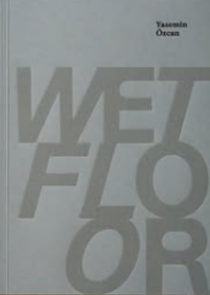
Yasemin Özcan: Wet Floor
| Subject | An in-depth exploration of Yasemin Özcan’s solo exhibition *Wet Floor*, addressing themes of intergenerational transmission, migration, and self-construction through the complex relations between human beings and earth, language and remembrance, autobiography and fiction |
| Author | Edited by: Eda Berkmen and Süreyyya Evren |
| Year | September 2024 |
| ISBN | 978-605-73355-7-9 |
| Publisher | Arter |
| Summary | This publication accompanies Yasemin Özcan’s solo exhibition at Arter and features an in-depth interview between the exhibition curator, Eda Berkmen, and the artist, along with essays by Kaya Genç, Evrim Kaya, and Işın Önol. The book highlights Özcan’s works in the exhibition, as well as her past exhibitions and productions, providing fresh insights into her various pieces. It also includes Özcan’s fictional text *V Collar*, which explores the experiences of female characters from three different generations, and the texts she wrote for her *Wet Floor* and *Sealant Sculptures* series. Designed by Ayşe Bozkurt, the book also features reproduction images and exhibition photographs by Hadiye Cangökçe and flufoto (Barış Aras & Elif Çakırlar). |
| Pages | 144 |
| Dimensions | 18 x 24.5 cm |
| Language | English |
| Price | 25 € |
| Design | Ayşe Bozkurt |
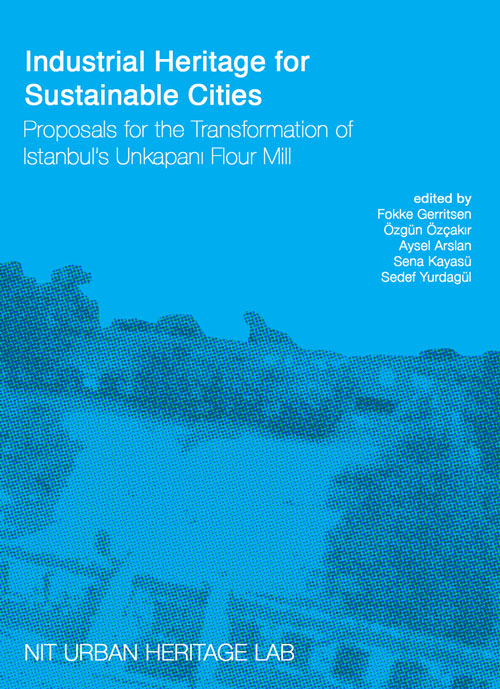
Industrial Heritage for Sustainable Cities: Proposals for the Transformation of Istanbul’s Unkapanı Flour Mill
| Subject | An exploration of the transformation of industrial heritage sites, addressing their tangible and intangible values, and their potential to foster urban inclusivity, sustainability, circularity, and public engagement. |
| Author | Edited by: Fokke Gerritsen, Özgün Özçakır, Aysel Arslan, Sena Kayasü, Sedef Yurdagül |
| Year | 2023 |
| ISBN | 978-605-72590-0-4 |
| Publisher | NIT Urban Heritage Lab |
| Summary | This publication is one of the outcomes of the inaugural program of the NIT Urban Heritage Lab. Following an introduction to the course, its scope, and its aims, the book showcases four proposals developed by the participants of the *Industrial Heritage for Sustainable Cities Course* for transforming the Unkapanı Flour Mill. These proposals are original, thought-provoking, and inspirational, while grounded in solid, multidisciplinary, and collaborative work, exemplifying the goals of NIT Urban Heritage Lab. |
| Pages | Not specified |
| Dimensions | Not specified |
| Language | English |
| Price | Free (Available for download) |
| Download | Download the book |
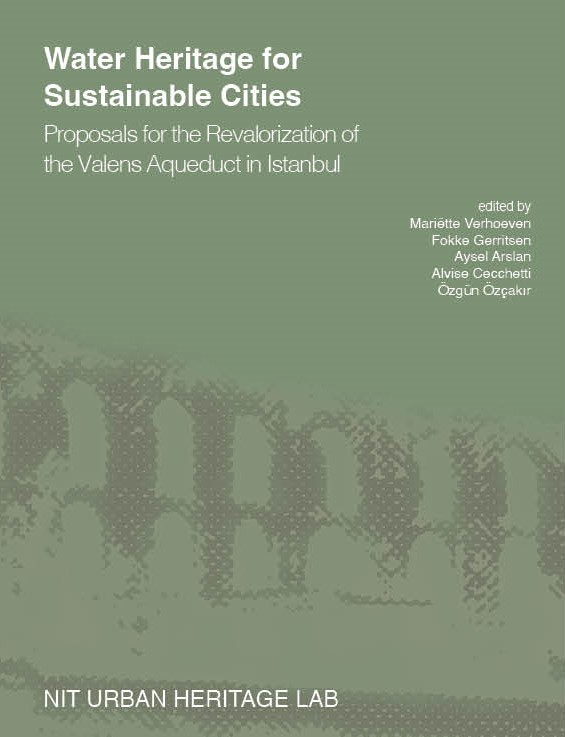
Water Heritage for Sustainable Cities: Proposals for the Revalorization of the Valens Aqueduct in Istanbul
| Subject | An exploration of the connections between urban water heritage appreciation and present-day water crisis awareness, aiming to develop integrated solutions for urban sustainability. |
| Author | Edited by: Mariëtte Verhoeven, Fokke Gerritsen, Aysel Arslan, Alvise Cecchetti, Özgün Özçakır |
| Year | 2023 |
| ISBN | 978-605-72590-2-8 |
| Publisher | NIT Urban Heritage Lab |
| Summary | This book presents the outcomes of the graduate-level course program *NIT Urban Heritage Lab: Water Heritage for Sustainable Cities*, offered by the Netherlands Institute in Turkey (NIT) in autumn 2022. The course explored innovative strategies to use tangible and intangible water heritage to promote urban sustainability during the climate crisis. The publication features four interdisciplinary and international team proposals developed as part of the program, showcasing informed and integrated approaches to addressing contemporary challenges. |
| Pages | Not specified |
| Dimensions | Not specified |
| Language | English |
| Price | Free (Available for download) |
| Download | Download the book |


